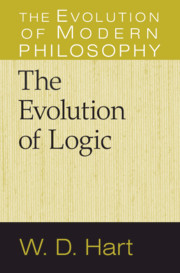Book contents
two - Die Urwahrheiten
Published online by Cambridge University Press: 05 June 2012
Summary
We are all post-Kantians, not perhaps because we believe the space in which we live and move and have our being is created by the action of our senses, but because Kant set an agenda for philosophy that we are still working through. Kant says (at 260 in his Prolegomenon to Any Future Metaphysics) that it was Hume who first interrupted the dogmatic slumbers into which Leibniz and Wolff had lulled him. Hume had argued that nothing in the idea of causation can guarantee that for each event there exists an earlier one that caused it; ideas do not guarantee that anything answers to them. But if it is not a relation of ideas that every event have a cause, then, if it is true, it can only be a matter of fact, and so known, if known at all, by experience. This conclusion was an affront to the dogma that the principle of sufficient reason is known and justified independently of any appeal to experience.
Kant composed his agenda for overcoming skepticism in terms that endured. Assume the anachronistically labeled traditional analysis according to which a person A knows that p (where “p” marks a blank to be filled by an indicative sentence) just in case A believes that p, it is true that p, and A is justified in believing that p. The point of the justification clause is that for A to know that p, his belief’s being true should not be just a lucky guess. The focus of epistemology, or theory of knowledge, has usually been more on the nature of justification than on details in the analysis of knowledge. Kant divides knowledge into two sorts that differ according to how the belief is justified. He calls knowledge a posteriori when it is justified, even in part, by appeal to sense experience. Knowledge is a priori when it is indeed knowledge but not a posteriori, that is, when it is justified but not justified even in part by sense experience. Note two points here. First, the account of a priori knowledge is wholly negative; it says only how a prioriknowledge is not justified. This raises the question how a priori knowledge is justified, and a refinement of that question will become the first agendum of Kant’s critical philosophy. Second, while nearly all parties agree that some knowledge is justified by sense experience, it may not be equally evident that there is a priori knowledge. This issue was on the philosophical agenda before Kant, and is still there two centuries after his death (in 1804). Kant himself thought we know a priori that for every event there is a prior event that caused it, and he worked hard to elaborate this thought. That principle was, he thought, necessary for natural sciences like physics, and while much of the physicist’s knowledge of nature is a posteriori, he could not have that a posteriori knowledge unless he knew a priori that every event has a cause. But Kant also believed that there are whole, systematic bodies of knowledge that are entirely known a priori. The two leading examples were logic and mathematics. We will return in a moment to what Kant thought logic was. From the Greeks to Kant, mathematics was first and foremost geometry. Geometry was not just Euclid’s system of figures in the plane, but also the solid geometry of the space in which we live and move and have our being. Kant is quite explicit that there is only one space; the idea of lots of spaces is later and thoroughly un-Kantian. In his Elements, Euclid’s Book IX is about number theory, like the infinity of primes. But the Greeks thought of number geometrically, and the mathematics of number achieves independence from geometry only in the arithmetization of analysis during the nineteenth century. It was central for Kant that our geometrical knowledge is a priori.
- Type
- Chapter
- Information
- The Evolution of Logic , pp. 31 - 58Publisher: Cambridge University PressPrint publication year: 2010

